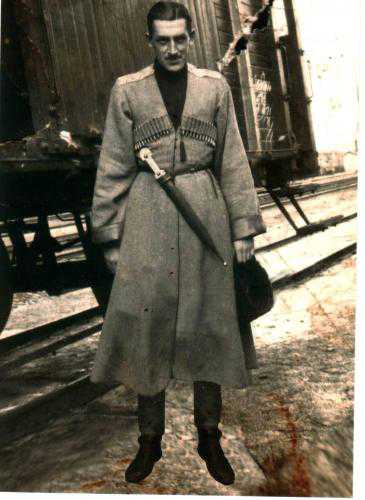Yurii Ilyich Lodyzhenskii was born on March 3, 1888, to a noble family in the south of Tver Governorate. In 1907, Lodyzhenskii (in some documents he appears as Georgii Ladyzhenskii) graduated from the college at St. Anne’s Lutheran Church in St. Petersburg, following which he studied at the St. Petersburg Imperial Military Medical Academy until graduation in 1912. Thereafter, he worked at the Orthopedic Institute and starting in 1915 led the Russian Red Cross Society (ROKK) infirmary named after Grand Duke Mikhail Alexandrovich for the Caucasian Native Cavalry Division. After the February Revolution, Lodyzhensky headed the Kiev Red Cross infirmary. He worked as a senior doctor until 1919.¹
In Kiev, Lodyzhenskii organized a committee to help victims of the Civil War. In 1919, he became a member of the ROKK Main Directorate under Lieutenant General Anton Denikin. From 1921 to 1926, he worked as a representative of the ROKK (the old organization) in Geneva. In 1923, together with the Swiss lawyer Theodor Aubert, he founded the International Anti-Communist League (also known as the Aubert League). Lodyzhenskii headed the Russian section², bringing Anatolii Lieven onto the organization’s board and maintaining contact with Georgii Leuchtenberg.
In 1931, together with his brother Alexandr, Yurii Lodyzhenskii founded the Russian Christian Labor Movement (Russkoe trudovoe khristianskoe dvizheniye, RTKhD)³, while in November 1932 he met with one of the leaders of the Brotherhood of Russian Truth, Valentin Vrede, to coordinate their anti-Bolshevik efforts.⁴
In 1933, Lodyzhenskii founded the international commission Pro Deo to aid victims of religious persecution. During World War II, he and his family lived in neutral Switzerland. After the war, he served as the secretary of the Grand Duke Vladimir Kirillovich in Madrid before following the rest of his family to Brazil, where he settled in Sao Paulo. There, he headed a group devoted to the study of literature and history and wrote for the journals "Russian Thought" and "Hour". Lodyzhenskii died in Rio de Janeiro on July 25, 1977.⁵
In Kiev, Lodyzhenskii organized a committee to help victims of the Civil War. In 1919, he became a member of the ROKK Main Directorate under Lieutenant General Anton Denikin. From 1921 to 1926, he worked as a representative of the ROKK (the old organization) in Geneva. In 1923, together with the Swiss lawyer Theodor Aubert, he founded the International Anti-Communist League (also known as the Aubert League). Lodyzhenskii headed the Russian section², bringing Anatolii Lieven onto the organization’s board and maintaining contact with Georgii Leuchtenberg.
In 1931, together with his brother Alexandr, Yurii Lodyzhenskii founded the Russian Christian Labor Movement (Russkoe trudovoe khristianskoe dvizheniye, RTKhD)³, while in November 1932 he met with one of the leaders of the Brotherhood of Russian Truth, Valentin Vrede, to coordinate their anti-Bolshevik efforts.⁴
In 1933, Lodyzhenskii founded the international commission Pro Deo to aid victims of religious persecution. During World War II, he and his family lived in neutral Switzerland. After the war, he served as the secretary of the Grand Duke Vladimir Kirillovich in Madrid before following the rest of his family to Brazil, where he settled in Sao Paulo. There, he headed a group devoted to the study of literature and history and wrote for the journals "Russian Thought" and "Hour". Lodyzhenskii died in Rio de Janeiro on July 25, 1977.⁵

Yurii Ilyich Lodyzhenskii (1888-1977)
Yurii Lodyzhenskii
Source
Source

Content Oriented Web
Make great presentations, longreads, and landing pages, as well as photo stories, blogs, lookbooks, and all other kinds of content oriented projects.
[1] Vasil’yev, Konstantin. ‘Istoriya Rossiyskogo obshchestva Krasnogo Kresta (staraya organizatsiya) v biografiyakh nekotorykh yeye deyateley’. Elektronnyy nauchno-obrazovatel’nyy zhurnal «Istoriya» 11, no. 2(88) (28 March 2020). doi:10.18254/S207987840008782-9.
[2] Bogatyrova, Lyudmila, and Potr Bazanov. ‘Russkaya emigratsiya o grazhdanskoy voyne 1917-1922 godov’. Vestnik RKHGA, no. 1 (2018): 23–31. https://cyberleninka.ru/article/n/russkaya-emigratsiya-o-grazhdanskoy-voyne-1917-1922-godov.
[3] Bazanov, Potr. ‘Izdatel’skaya deyatel’nost’ politicheskikh organizatsiy russkogo zarubezh’ya na primere “Russkogo trudovogo khristianskogo dvizheniya”’. Izvestiya vysshikh uchebnykh zavedeniy. Problemy poligrafii i izdatel’skogo dela, no. 1 (2006): 123–31.
[4] Bazanov, Petr. Bratstvo Russkoy Pravdy – samaya zagadochnaya organizatsiya Russkogo Zarubezh’ya. Moskva: Posev, 2013.
[5] enzel.livejournal.com. ‘O vospominaniyakh YU.I.Lodyzhenskom’. enzel.livejournal.com, 25 September 2013. https://enzel.livejournal.com/239000.html?
[2] Bogatyrova, Lyudmila, and Potr Bazanov. ‘Russkaya emigratsiya o grazhdanskoy voyne 1917-1922 godov’. Vestnik RKHGA, no. 1 (2018): 23–31. https://cyberleninka.ru/article/n/russkaya-emigratsiya-o-grazhdanskoy-voyne-1917-1922-godov.
[3] Bazanov, Potr. ‘Izdatel’skaya deyatel’nost’ politicheskikh organizatsiy russkogo zarubezh’ya na primere “Russkogo trudovogo khristianskogo dvizheniya”’. Izvestiya vysshikh uchebnykh zavedeniy. Problemy poligrafii i izdatel’skogo dela, no. 1 (2006): 123–31.
[4] Bazanov, Petr. Bratstvo Russkoy Pravdy – samaya zagadochnaya organizatsiya Russkogo Zarubezh’ya. Moskva: Posev, 2013.
[5] enzel.livejournal.com. ‘O vospominaniyakh YU.I.Lodyzhenskom’. enzel.livejournal.com, 25 September 2013. https://enzel.livejournal.com/239000.html?